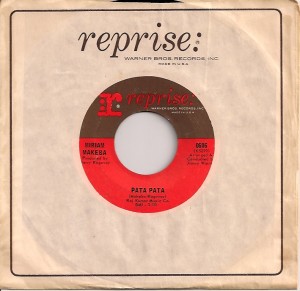Listen: Pata Pata / Miriam Makeba
Pata Pata / Miriam Makeba
A traditional African song by a native artist becoming a US radio and chart hit (#12, 10/67)? Probably a first, definitely a last. Seriously, I can’t remember it ever happening again. Programmers with their false sense of knowing the public taste and dismissive musical arrogance were actually powerful all through the 70′s, 80′s and 90′s. Even after the industry coined the sound ‘world music’ and it became chic, off the US airwaves it was kept – maybe Paul Simon’s GRACELAND got some radio attention, but nowhere near matching the sales story. That’s as far as the door opened. And not ever again for a native artist. Did any pop, alternative or more pointedly, urban station play King Sunny Ade & His African Beats or Ladysmith Black Mambazo? Yeah right. So much for a melting pot and honoring heritage.
This, of course, before the gatekeepers lost that power and their stronghold was decimated. But all those years of musical censorship took it’s toll. Just look at the tastes of the average American. Yikes.
Released not long after The Dixie Cups ‘Iko Iko’ became a hit, both hooked me with the rhythm and ambience of drums, sticks, bongos – whatever. It all sounded pretty fascinating. ‘Pata Pata’ never struck me as out of place, or threateningly different, just a great single. I collected all the Reprise 7′s to follow, about 5-6 more. Who realized at the time that Jerry Ragovoy was involved in the Miriam Makeba story, not only as producer, but co-songwriter. True, he was in the studio with her while juggling sessions with Lorraine Ellison. How great is that?
Reprise, and parent company Warner Brothers, had a most seminal and diverse roster, beginning in the 60′s. All you need do is pull out any of the label’s album inner sleeves listing their currents to see. In fact, that diversity and standard continued for decades, all under Mo Ostin’s leadership. His taste in music, and instinct for executives goes a bit unheralded in the history books, but it was there and vastly important to a healthy underground music culture in America.
Tags: Jerry Ragovoy, King Sunny Ade & His African Beats, Ladysmith Black Mambazo, Lorraine Ellison, Miriam Makeba, Paul Simon, Reprise, The Dixie Cups, Warner Brothers
